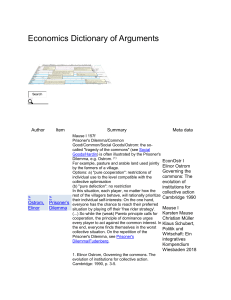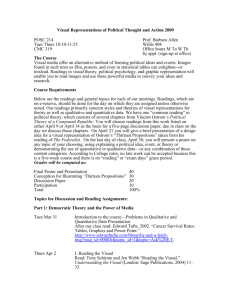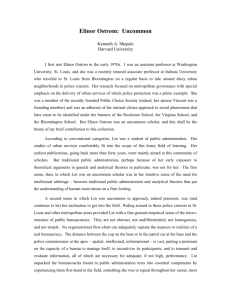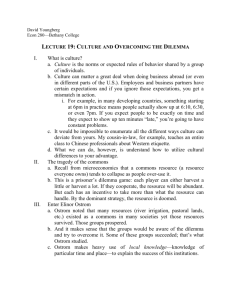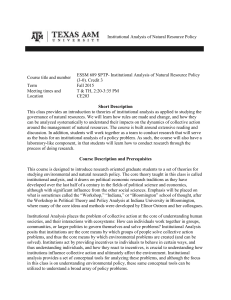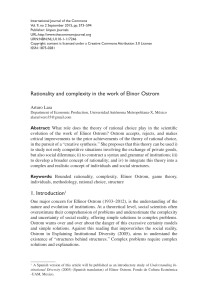The Benefits of a Mixed Economy - Institute of Public Administration
advertisement
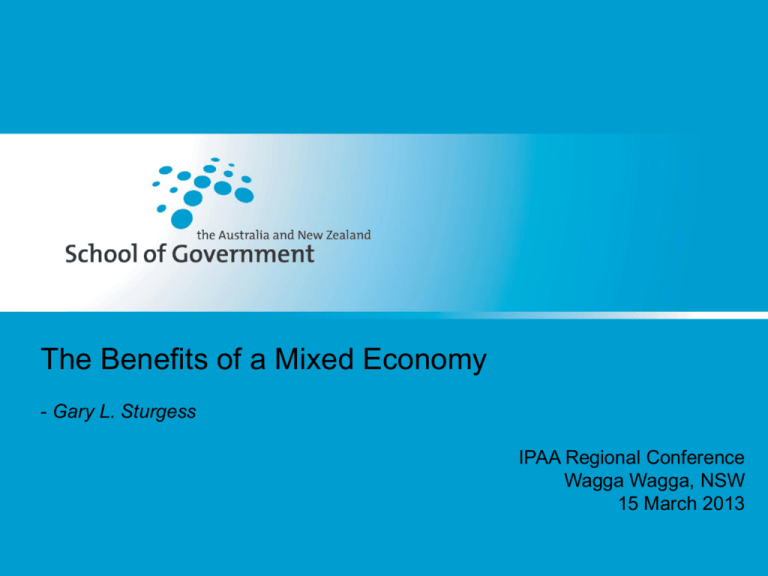
The Benefits of a Mixed Economy - Gary L. Sturgess IPAA Regional Conference Wagga Wagga, NSW 15 March 2013 Public services Craft guild? Public services Corporation? Public services Mixed economy? The public service sector is an economy The public service economy Vincent & Elinor Ostrom The public service sector is an economy “A public economy need not be an exclusive government monopoly. It can be a mixed economy with substantial private participation in the delivery of public services.” - Vincent & Elinor Ostrom Public service industries “The water industry, for example, is composed of a very large number of highly independent federal, state and local government agencies, operating side by side with large numbers of private utility companies, cooperative associations and individual proprietorships. “The American educational system can be conceptualized as an industry composed predominantly of many independent public enterprises and non-profit private enterprises. . .” - Vincent & Elinor Ostrom Diversity in supply “Different industries in the public sector are subject to as great variation in patterns of organization, in technology, and in production methods as are industries in the private sector.” - Vincent & Elinor Ostrom Supply side and demand side “When we begin by assuming the existence of collective-consumption units, the conception of governments as monopoly suppliers is less compelling. . . . . . we might expect public-service industries to vary from highly-integrated monopolies to highly fragmented industry structures with a multiplicity of suppliers serving any given service area.” - Vincent Ostrom Different scale & scope “. . . a small collective consumption unit might contract with a large production unit and each might take advantage of diverse scale considerations in both the consumption and production of a public good or service. “It may also happen that the collective consumption unit is large but that efficient production is realized on a smaller scale.” It is a mixed economy Australia already has a mixed economy • 90% of residential aged care is delivered by the private and third sectors • 40% of hospital inpatients are treated in a private hospital • 40% of secondary students attend a private school • 20% of prisoners are managed by a private provider It is a significant part of the national economy Australia’s public service sector accounts for 15-20% of GDP, more than the mining and manufacturing sectors combined. It represents around 25% of the national workforce. There are benefits in having a mixed economy 15 1. Improved Productivity What evidence we have from benchmarking and competitive tendering suggests potential productivity gains of around 20% 1. Improved Productivity 1. Improved Productivity 2. Increased Accountability ‘Transparency of management is of no avail without eyes to look at it.’ - Jeremy Bentham, 1791 3. Better Quality Boggo Road Gaol, Brisbane In Queensland, prison contracting was used to improve the quality of health services and rehabilitation programmes. 3. Better Quality In the UK, 10 out of 12 privately managed prisons achieve lower reoffending rates than comparable public sector prisons. 4. Innovation 4. Innovation In the UK, prison contracting was accompanied by significant innovation in design and delivery. 4. Innovation In the UK, prison contracting was accompanied by significant innovation in design and delivery. 5. Increased diversity • Increases individual and collective choice • Makes public services more adaptable • Gives us a deeper ‘gene pool’ from which to fashion new institutional forms for an uncertain future • Allows for innovation in parallel rather than in serial 6. Spread of Best Practice Narayana Hospital, Bangalore: high quality heart surgery for a tenth of the cost. As the Australian public service sector is presently structured, there is limited spread of best practice across borders. 6. Spread of Best Practice Education is the nation’s 3rd largest export overall, after iron ore and coal - in NSW, the 2nd largest. From 1982 to 2007, education exports grew at an average annual rate of 14%. We should embrace the mixed economy 28 Commissioning Policymakers worry about the 60% of public services that they directly control, and fail to manage the 100%. Commissioning Objectives Obstacles Contracting forces policymakers to address issues of service outcomes, system design, performance measurement, intervention regimes and alternative delivery models, up front. Allies Context Capabilities 30 System design: C3PO 31 System design: C3PO System design: C3PO NASA’s Commercial Crew/Cargo Program: • To implement US Space Exploration policy with an investment to stimulate commercial enterprises in space; • To facilitate US private industry demonstration of cargo and crew space transportation capabilities with the goal of achieving reliable, cost effective access to low-Earth orbit; and • To create a market environment in which commercial space transportation services are available to government and private sector customers. 33 Discussion
